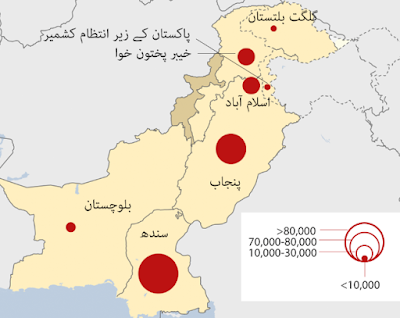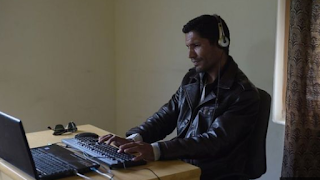Corona virus: Teaching process continues in Pakistan but students face problems
The situation caused by the corona virus has become an economic and social threat and has completely gripped the entire world. Measures to ensure a reduction in social interaction are necessary for the safety of the people, but it is affecting the students' academic year the most after the economy, the routine of life. Initial measures taken by the Pakistani government to curb the spread of the corona virus included closing educational institutions.
In this regard, Federal Minister for Education Shafqat Mahmood had announced that online classes of higher education institutions would be started in the country in collaboration with the Higher Education Commission to save the education of students from being disrupted. A large number of students from small towns and remote areas are studying in city universities. These students living in hostels had to return to their home areas after the closure of universities.
Pakistan's universities do not have an integrated system of online classes, so the existing resources on the Internet, including Google Plus, Zoom, YouTube and other social media applications are being used.
After the launch of online classes, students across Pakistan are seen complaining about the lack of internet service and power outages.
Federal Minister for Education Shafqat Mahmood informed that the holidays of private and government educational institutions across the country have been extended. According to the notification of the Ministry of Education, the closure of educational institutions will be as a summer vacation. However, according to several students, the government's decision has not yet been formally reported by educational institutions, nor have universities been able to rectify the shortcomings in online classes, while several students have also stated that their universities Requiring to pay quarterly installment of annual fee.
What problems do students face when conducting online classes?
Muhammad Azam Baloch, a resident of a village on the outskirts of Balochistan's Jaffarabad district, told the BBC that he is a student of international relations at the University of Management Sciences and Technology in Lahore. He says, "According to the schedule given by the administration, online classes of three to four subjects are held daily from 10 am to 6 pm, but in the last one week, students have not lectured on a single subject in a proper manner." Mohammad Azam Baloch said, "I go to Jaffarabad 25 km from Rawazana village in search of better internet service to ensure attendance in my classes and even there I can't hear the voices of the teachers in the video lectures."
Gilgit resident Aliza Khan is a media science student at Foreman Christian College. She says the university administration closed the university in response to a government decision and asked her to vacate the hostel on the same day in the third week of March, after which she has been living in Gilgit.
Aliza says she received an e-mail last week scheduleing online classes, while students in areas with inappropriate internet service were asked to notify a senior university official.
Aliza Khan told the BBC that she lives in Gilgit, where internet access is better than in nearby areas, but she is having difficulty in online classes due to severe power outages. "There is not a single day in our online class in which students have not complained about not understanding the lecture," she says. I and several students in my class have informed the university administration of this problem, to which no response has been received so far.
He said, "The university administration has informed the senior student that their mid-term examinations will be conducted on the basis of assignments, which is a clear indication that the administration is unable to understand that the completion of assignments Under the circumstances, it is not possible without the Internet and it is tantamount to playing with the future of the students.
A number of students at the National University of Modern Sciences in Islamabad have spoken to the BBC about similar problems, but none of them has agreed to be named. The administration has been told to take a hard line when news of the university comes out in the media. A student from Bajaur District, which merged with Khyber Pakhtunkhwa, told the BBC that load shedding was taking place in his area for more than 20 hours, which prevented mobile charging and Nor laptop. He says only 2G internet service is provided on the network of only one mobile company in Bajaur, with the help of which it takes two to three days to receive WhatsApp messages, let alone join an online class. Go
An easy-going or internet package has become a big problem for me in the face of the Corona epidemic, says a Namal University student from a village in Sindh's Larkana district.
Due to the Corona situation in Sindh, the local administration and police are much stricter than in other parts of Pakistan. On the one hand, it is difficult and dangerous to get out of the house, on the other hand, all shopping malls are completely closed, Mobile cards or easyloads are not available in the occasional shops.
Zainab Aurangzeb, a student at Punjab University Lahore, says her university administration is not serious about online classes.
"Both students and teachers do not have a good understanding of technology. Corona virus has severely affected students psychologically and to get an education in a situation where you can neither understand the teacher's voice nor ask them again is where it is academically detrimental. It's a very painful process, psychologically.
What student organizations have to say
Progressive Students Collective, a student organization, has been raising its voice on social media over the issue of online classes, examinations and fees by public and private educational institutions across the country.
Ali Behram, a member of the organisation's central committee, told the BBC that the government's plan for online classes in the wake of the Corona virus crisis has prompted some major cities in the country to respond. Can only be implemented to the extent of.
Ali Behram says, "Technology in Pakistan has not developed enough to provide online education to students in Balochistan or any other remote area."
"The whole country is in lockdown, businesses are closed, human lives are in imminent danger and educational institutions, especially private universities, are asking students to pay their fees," he said. This facility was given to poor parents because it was not possible for them to pay their children's fees in one lump sum. Ali Behram said that students of private universities are being most affected in this situation.
However, private educational institutions that pay the salaries of their teachers and staff from student fees do not seem to be able to provide relief to students without government intervention.
What is the government's position?
Federal Education Minister Shafqat Mahmood told the BBC that the Higher Education Commission was an independent body and could take all possible steps to address complaints from students about online classes. ۔ He said that the federation, through continuous liaison with the provinces, has adopted a strategy to deal with the situation arising out of corona virus in schools, colleges and examinations.
"But we all have to keep in mind that if this situation continues for the next few months, there could be a lot of damage in the field of education as well as in other fields, so there is no solution other than online classes." Through which comprehensive educational activities can be continued. The Higher Education Commission may also want to continue the series of online classes in the future.
Talking about the issues faced by the students of private educational institutions regarding fees, Shafqat Mahmood said that private institutions attribute this to the payment of their employees and other expenses.
"We saw in Sindh province that after a complete lockdown, there were incidents in which restaurants fired their employees to reduce costs."
The Federal Minister for Education said that a high level meeting was held in Bani Gala Islamabad on Sunday under the chairmanship of Prime Minister Imran Khan on the steps taken by the government to hand over the corona virus. The meeting also discussed the demand of parents studying in private educational institutions not to charge fees due to the current situation and the position of educational institutions.







Comments
Post a Comment